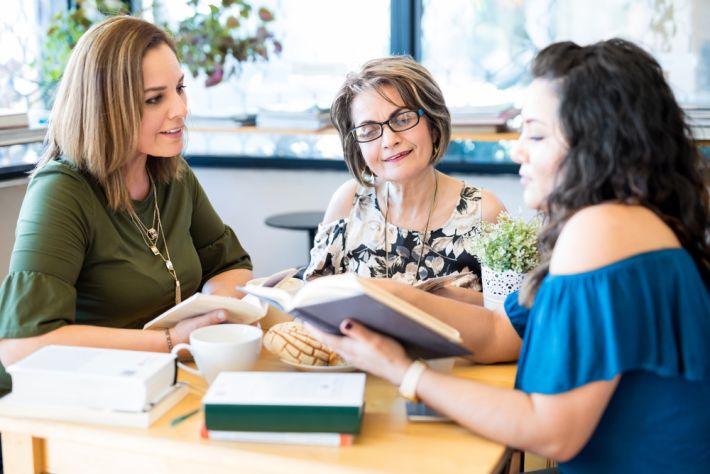- in Health and Wellness by Tony
Bibliotherapy: A Book Club With A Difference

What is Bibliotherapy?
Bibliotherapy is a therapeutic approach that uses literature to support mental health and wellbeing. It involves the use of books, poems, and other written materials to help individuals understand and cope with their emotions, thoughts, and behaviours.
Bibliotherapy can be used in various settings, including schools, libraries, hospitals, and therapy sessions. Words and images in literature and poetry connect us to the past, showing that others have faced and overcome similar experiences. This brings comfort and reassurance that difficult times will eventually pass.
More...

The concept of bibliotherapy dates back to Ancient Greece, where it was believed that reading could heal the soul. In the 20th century, bibliotherapy gained popularity as a form of psychotherapy, and today, it is recognized as a valuable tool for enhancing mental health and wellbeing.
There are different types of bibliotherapy, including self-help, guided, and creative bibliotherapy.
Self-help bibliotherapy involves reading books on one's own, while guided bibliotherapy involves working with a therapist or counsellor who recommends specific books.
Creative bibliotherapy involves using writing or other creative activities to explore one's emotions and thoughts.
Benefits of Bibliotherapy
Bibliotherapy has numerous benefits for individuals of all ages and backgrounds. Some of the key benefits include:
Enhancing mental health and wellbeing
Bibliotherapy can help individuals manage symptoms of anxiety, depression, and other mental health conditions.
Reading can provide a sense of comfort and support, and it can also help individuals gain new insights into their emotions and behaviours.
Enhancing mental health and wellbeing
Reading can improve literacy skills and enhance communication skills, including the ability to express oneself effectively and understand others' perspectives.
Fostering personal growth and self-awareness
Bibliotherapy can help individuals reflect on their own experiences and better understand themselves. It can also promote personal growth and self-awareness by encouraging individuals to explore their emotions and behaviours.
Applications of Bibliotherapy
Bibliotherapy can be used in various settings and for different purposes. Some of the key applications of bibliotherapy include:
Bibliotherapy for children and adolescents

Bibliotherapy can help children and adolescents develop emotional intelligence, improve their literacy skills, and cope with various challenges, including bullying, anxiety, and depression.
Bibliotherapy for adults
Bibliotherapy can help adults manage stress, improve their mental health, and enhance communication skills. Bibliotherapy can also be used in the workplace to help employees manage stress and enhance their wellbeing. It can also be used in educational settings, such as libraries and schools, to help students develop literacy skills and foster a love of reading.
Finally, bibliotherapy can be used in therapeutic settings to help individuals explore their emotions and gain insights into their behaviour. It can also be used to help individuals cope with difficult life events, such as grief or loss.
Bibliotherapy for specific mental health conditions
Bibliotherapy can be used to support individuals with specific mental health conditions, including anxiety, depression, and post-traumatic stress disorder (PTSD).
What's more, bibliotherapy can be used to support individuals with physical health conditions, such as chronic pain and cancer. It can also be used to help individuals recover from trauma and abuse. Finally, bibliotherapy can be used to promote positive thinking and self-care.
Bibliotherapy in group settings
The UK is also worried about its ageing population. But they have found a solution. They have discovered that bibliotherapy and facilitated shared reading groups can actually help improve mental health and support overall wellbeing.
Not surprisingly, facilitated shared reading group programs are becoming increasingly popular activities in community organisations, retirement villages and residential homes in the UK, USA and Australia, how cool is that?
Bibliotherapy can be used in group settings, such as support groups or therapy sessions, to promote discussion and reflection among participants.
Bibliotherapy can also be used to enhance relationships, as it can help individuals gain a better understanding of themselves and their relationships with others.
It can also be used to support individuals in times of crisis or transition. Finally, bibliotherapy can be used to facilitate self-discovery and create meaningful connections with others.
Overall, bibliotherapy is a powerful tool that can be used to promote mental health and wellbeing. It can be used to help individuals cope with difficult emotions, understand themselves better, and foster meaningful connections with others. By incorporating bibliotherapy into one's life, individuals can a greater sense of self-awareness and empowerment.
How to Practice Bibliotherapy

Practising bibliotherapy involves choosing the right books, incorporating them into therapy sessions, and reading for self-help and personal growth. When practising bibliotherapy, it is important to choose books that are relevant to the individual's needs and interests.
For example, someone with depression may benefit from reading books exploring hope and resilience themes. Additionally, individuals should be encouraged to read books that challenge them to think critically and gain new insights
When incorporating books into therapy sessions, it is important to create a safe and supportive environment. Therapists should create space for individuals to explore their emotions and gain a better understanding of themselves. Reading should be seen as a form of self-care, and individuals should be encouraged to take their time when reading.
Finally, when reading for self-help and personal growth, individuals should be encouraged to reflect on their own experiences.
Reading should be seen as an opportunity for self-discovery and growth. As individuals read, they should be encouraged to explore their emotions and gain new insights into their behaviour.
Choosing the right books for bibliotherapy

When choosing books for bibliotherapy, it is important to consider the individual's interests, needs, and preferences. Choosing books that are age-appropriate and relevant to the individual's experiences is also important.
It is also necessary to consider the individual's literacy level when selecting books for bibliotherapy. Additionally, it is important to ensure that the books chosen are appropriate for the individual's culture and language. Furthermore, it is important to consider the individual's motivation when selecting books, as this can influence their engagement and enjoyment of reading.
Finally, it is important to ensure that the books chosen are accessible, as this can help to promote a sense of inclusion and belonging for the individual. It is essential to remember that bibliotherapy should be tailored to the individual, so it is vital to select books that are meaningful and relevant to the individual's needs.
Incorporating bibliotherapy into therapy sessions

Bibliotherapy can be incorporated into therapy sessions by discussing specific books or passages with the individual and exploring their thoughts and emotions. Bibliotherapy can also be used to foster creativity and self-expression among individuals.
For example, creative bibliotherapy can involve writing, drawing, and other forms of creative expression. This can be a powerful way to explore one's emotions and gain a deeper understanding of oneself.
Bibliotherapy can also be used to promote positive social connections. Reading can help individuals develop empathy and understanding of others, and it can also be used to facilitate meaningful conversations and connections.
It can also be used to support individuals in their academic pursuits. Reading can help individuals develop their critical thinking and problem-solving skills, which can benefit the classroom and beyond.
DIY bibliotherapy: reading for self-help and personal growth
Individuals can practice bibliotherapy on their own by reading books that address their specific needs and interests. There are numerous resources available, including self-help books and memoirs.
Bibliotherapy Resources and Recommendations
There are many resources available for individuals interested in bibliotherapy, including recommended books, online resources, and training programs.
Recommended books for bibliotherapy
The American Library Association and the American Psychological Association (APA) offer recommended reading lists for bibliotherapy. Some popular books for bibliotherapy include "Veronika Decides To Die" by Paulo Coelho, "The Bell Jar" by Sylvia Plath, and "The Catcher in the Rye" by J.D. Salinger.
Online resources for bibliotherapy
Many online resources are available for bibliotherapy, including the Federal Government site for the Department of Health and Human Services, which offers information on bibliotherapy for mental health. Individuals can also download the free Kindle app or use Amazon Prime for free book shipping.
Bibliotherapy training and certification programs
There are several training and certification programs available for individuals interested in practising bibliotherapy, including the National Association for Poetry Therapy and the International Federation for Biblio/Poetry Therapy.
Conclusion
Bibliotherapy is a valuable tool for enhancing mental health and wellbeing, improving literacy and communication skills, boosting empathy and emotional intelligence, and fostering personal growth and self-awareness.
It can be used in various settings and for different purposes, including supporting individuals with specific mental health conditions and promoting discussion and reflection in group settings.
By choosing the right books, incorporating them into therapy sessions, and reading for self-help and personal growth, individuals can experience the transformative power of bibliotherapy.



